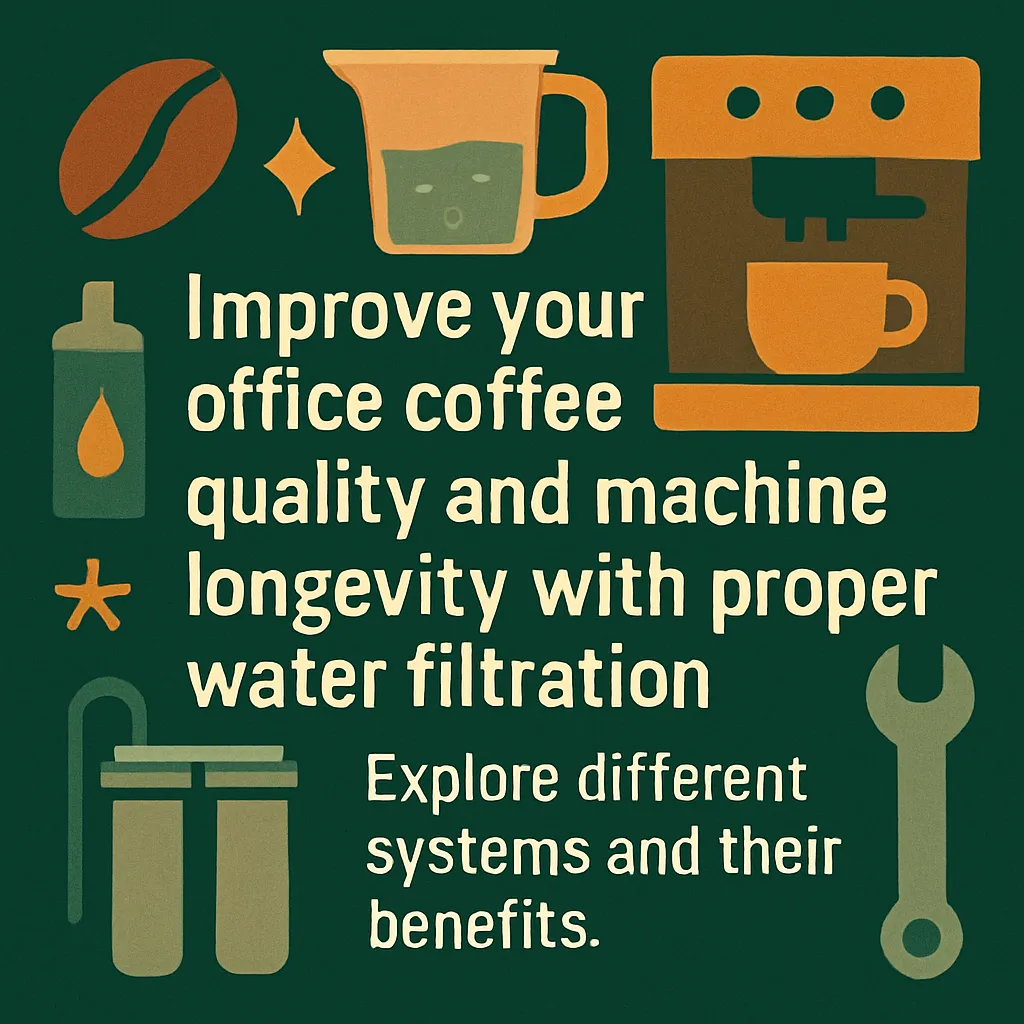Water Filtration for Office Coffee
Improve your office coffee quality and machine longevity with proper water filtration. Explore different systems and their benefits.
Back to Office Coffee Services ResourcesImprove your office coffee quality and machine longevity with proper water filtration. Explore different systems and their benefits.
Back to Office Coffee Services ResourcesElevate your office coffee experience by investing in quality water filtration. Not only does it enhance taste, but it also safeguards your valuable brewing equipment from scale and impurities, ensuring reliable, delicious coffee every time.
![]() Experience coffee with enhanced flavor and aroma
Experience coffee with enhanced flavor and aroma
![]() Protect your coffee machines from costly mineral damage
Protect your coffee machines from costly mineral damage
![]() Ensure consistent, high-quality brews for your team
Ensure consistent, high-quality brews for your team

The quality of your office coffee hinges significantly on one often-overlooked factor: your water. Unfiltered water, laden with impurities, chlorine, and minerals, can drastically compromise the taste of your coffee, leading to bitter, flat, or inconsistent brews that disappoint employees and clients alike. Investing in proper water filtration is not just about a better-tasting cup; it's a strategic decision that impacts the longevity of your equipment and the overall satisfaction of your workforce.
High-quality water filtration removes undesirable elements like chlorine, sediment, and excessive minerals that can taint coffee flavor and aroma. When these impurities are gone, the true, rich notes of your coffee beans can emerge, delivering a more enjoyable and authentic coffee experience. Beyond taste, filtration is crucial for protecting your valuable office coffee machines. Hard water minerals cause scale buildup, which clogs internal components, reduces brewing efficiency, and shortens the lifespan of your equipment, leading to frequent maintenance and costly repairs. To optimize your overall breakroom setup, consider pairing advanced water filtration with a reliable office coffee service that aligns with your specific needs.
Several types of water filtration systems are suitable for office environments, each with unique advantages. Activated carbon filters excel at removing chlorine, odors, and organic compounds, ideal for improving basic taste. Reverse osmosis (RO) systems offer a more thorough purification, stripping away almost all dissolved solids, ensuring exceptionally clean water. Water softeners specifically target hard minerals, preventing scale and extending equipment life. Selecting the right system depends on your local water quality and specific coffee preferences. A comprehensive cost of office coffee service analysis should always factor in the long-term savings and benefits of suitable water filtration.
While there's an initial investment in a quality filtration system, the long-term benefits far outweigh the costs. Fewer machine breakdowns mean less downtime and lower repair expenses. Additionally, consistent, great-tasting coffee boosts employee morale and productivity, making the office a more inviting place. Imagine employees starting their day with a perfectly brewed cup, free from off-flavors, feeling energized and appreciated. To further enhance your office's refreshment program, look into options like breakroom coffee and snack bundles that complement your superior coffee offerings.
Water filtration significantly improves the taste of coffee, protects coffee machines from mineral buildup, and ensures a more consistent brew quality.
Common types include activated carbon filters, reverse osmosis (RO) systems, and water softeners, each addressing different water quality issues.
Poor water quality, characterized by excess chlorine, minerals, or sediment, can introduce off-flavors, making coffee bitter, dull, or overly acidic.
Yes, hard water minerals like calcium and magnesium can lead to limescale buildup, clogging internal components and reducing the lifespan of coffee makers.
The frequency depends on water usage, local water quality, and the type of filter, but generally every 3-6 months is recommended for optimal performance.
Yes, many systems are designed for efficiency, and some use reusable cartridges or materials to reduce environmental impact.
A water softener primarily removes hard minerals, while a filter typically removes sediment, chlorine, and other contaminants to improve taste and odor.
While there's an initial investment and replacement cost, filtration reduces machine maintenance, extends equipment life, and enhances coffee quality, offering long-term value.
Yes, by removing impurities that mask natural coffee aromas, filtration allows the true fragrance of the beans to shine through, contributing to a more enjoyable experience.
It is typically installed directly into the water line feeding the coffee machine, often discreetly under the counter or near the brewing station.